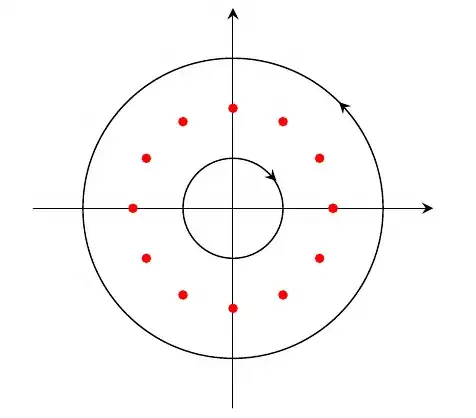Here is an answer when $t = 2s$ is even.
Let $n, s$ be non-negative integers. Then with $\zeta = \mathrm{e}^{i\pi/n}$ and $\omega = \zeta^2 = \mathrm{e}^{2i\pi/n}$, we have
\begin{align*}
2^{2s} \sum_{k=0}^{n-1} \sin^{2s} \left(\frac{\pi k}{n} \right)
&= \sum_{k=0}^{n-1} \left( \frac{\zeta^k + \zeta^{n-k}}{i} \right)^{2s} \\
&= (-1)^{-s} \sum_{k=0}^{n-1}\sum_{l=0}^{2s} \binom{2s}{l} \zeta^{(2s-l)k+l(n-k)} \\
&= (-1)^{-s} \sum_{k=0}^{n-1}\sum_{l=0}^{2s} \binom{2s}{l} (-1)^l \omega^{(s-l)k}.
\end{align*}
Interchanging the order of summation, we have
\begin{align*}
2^{2s} \sum_{k=0}^{n-1} \sin^{2s} \left(\frac{\pi k}{n} \right)
&= \sum_{l=0}^{2s} (-1)^{l-s} \binom{2s}{l} \left( \sum_{k=0}^{n-1} (\omega^{s-l})^k \right) \\
&= \sum_{l=0}^{2s} (-1)^{l-s} \binom{2s}{l} \left( n \cdot \mathbf{1}_{\{ l \equiv s \ (\mathrm{mod} \ n)\}} \right) \\
&= n \sum_{j} (-1)^{nj} \binom{2s}{s+nj},
\end{align*}
where the last summation runs over all integers $j$ such that $-\frac{s}{n} \leq j \leq \frac{s}{n}$.
Examples. As special cases, plugging $s = n$ yields
$$ \sum_{k=0}^{n-1} \sin^{2n} \left(\frac{\pi k}{n} \right) = \frac{n}{2^{2n}} \left[ \binom{2n}{n} + (-1)^n 2 \right], $$
and similarly, replacing $n$ by $2n$ and plugging $s = n$ yields
$$ \sum_{k=0}^{n-1} \sin^{2n} \left(\frac{\pi k}{2n} \right) = \frac{n}{2^{2n}} \binom{2n}{n} - \frac{1}{2}. $$
Addendum. Here is an intuition on why we expect the sum to be simplified. If $t = 2s$ is even, then we can expand $\sin^{2s} x$ into a linear combination of $1, \cos 2x, \cos 4x, \cdots, \cos 2sx$. So in our case, we may write
$$ \sin^{2s} \left(\frac{\pi k}{n}\right) = \sum_{j=0}^{s} a_j \cos \left(\frac{2\pi j k}{n}\right). $$
Now, as you sum this over $k = 0, \cdots, n-1$, all the cosine terms will cancel out except when $j$ is a multiple of $n$. This means that
$$ \sum_{k=0}^{n-1} \sin^{2s} \left(\frac{\pi k}{n}\right) = n (a_0 + a_n + a_{2n} + \cdots). $$
So it is enough to identify $a_j$ for $j$'s multiple of $n$. This can be done by expanding $\sin^{2s} x$ using complex exponential and the binomial theorem. This is essentially what we did in the computation above.
On the other hand, this trick does not work for odd $t$. Indeed, when $t = 2s+1$ is odd, we can write
$$ \sin^{2s+1} \left(\frac{\pi k}{n}\right) = \sum_{j=0}^{s} a_j \sin \left(\frac{\pi (2j+1)k}{n}\right) $$
for some constants $a_0, \cdots, a_n$. (In fact, $a_j = (-1)^j 2^{-2s} \binom{2s+1}{s-j}$.) Now summing both sides for $k = 0, \cdots, n-1$,
\begin{align*}
\sum_{k=0}^{n-1}\sin^{2s+1} \left(\frac{\pi k}{n}\right)
&= \sum_{j=0}^{s} a_j \sum_{k=0}^{n-1} \sin \left(\frac{\pi (2j+1)k}{n}\right) \\
&= \frac{1}{2^{2s}} \sum_{j=0}^{s} (-1)^j \binom{2s+1}{s-j} \cot \left(\frac{\pi(2j+1)}{2n}\right).
\end{align*}
It is hard for me to believe that this will ever simplify except for some nice $s$.
Addendum 2 (Just for fun). Although no longer simpler than the original sum, one can also prove that for complex $t$ with $\Re(t) > 0$ and for positive integer $n$ the following formula holds:
$$\sum_{k=0}^{n-1} \sin^{t} \left(\frac{\pi k}{n} \right) = \frac{n}{2^{t}} \sum_{j=-\infty}^{\infty} (-1)^{nj} \binom{t}{\frac{t}{2}+nj}. $$
Here, $\binom{n}{k} = \frac{\Gamma(n+1)}{\Gamma(k+1)\Gamma(n-k+1)}$ is the extended binomial coefficient.
